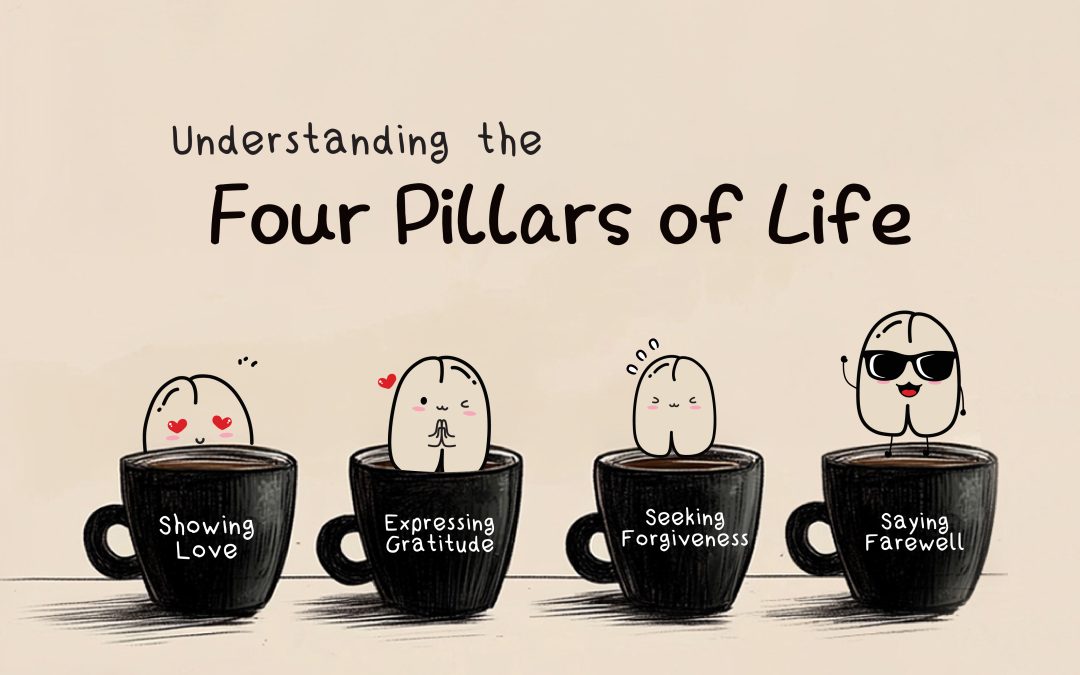The Four Pillars of Life originally served as a guiding principle for individuals to reflect upon their journey as they come to the end of life. These four essential actions—expressing gratitude, seeking forgiveness, showing love, and saying farewell—were meant to help people find closure and peace before passing. Over time, various associations and organizations have actively promoted these values, encouraging families to support their elders in resolving past grievances and making peace with themselves and the world while they are still lucid and able. This allows them to depart with a heart full of gratitude and without regrets.
From a young age, we often hear these words, “birth, aging, illness and death,” suggesting that life follows a natural order. However, a casual glance at the obituary display updated daily at Nirvana Center Kuala Lumpur’s lift lobby, reveals names that include both men and women, as well as those of the young and the elderly. The shocked and grief-stricken expressions of families caught off-guard arriving at funeral parlours are clear indications that not everyone departs life in a predictable manner. Reflecting on departed loved ones, those who found themselves faced with their own mortality are more often than not overwhelmed. Those who had to watch over them were similarly affected—if not worse—wishing they had expressed more before it was too late. This is why we should begin putting the Four Pillars of Life into practice, regardless of where we are in life—rather than waiting for old age or our final days.
The Four Pillars of Life often appears like a set sequence—starting with “expressing gratitude, seeking forgiveness, showing love,” and with “saying farewell” as the final step. Perhaps it is because goodbyes often evoke a sense of melancholy and regret, that people are reluctant to face it. However, if we view the Four Pillars as a lifelong practice, we should allow each of these four aspects to manifest freely, without the perceived rigid sequencing. This implies that any of the four aspects can be revisited randomly at any time depending on the circumstances and needs of the situation.

The Four Pillars: The Bearing of the Pillars
The Four Pillars of Life—expressing gratitude, seeking forgiveness, showing love and saying farewell—seems simple in theory, yet it is not always easy in practice. For children, these actions come naturally; for adults however, somewhat less so. Polite expressions such as “thank you” or “sorry” exist in our daily interactions, but the difference lies in depth. In casual exchanges, these words convey courtesy; in the Four-Fold Path, they strengthen emotional bonds. This distinction is often why adults, especially those unaccustomed to expressing emotions, struggle to verbalize their feelings, eventually forgetting the importance of these four actions.
What makes the Four Pillars so impactful is not merely saying the words, but ensuring they are spoken at the right time, to the right people, with sincerity. When infused with meaning, these simple phrases become powerful and transformative.
Thus, the Four Pillars is not just about saying “thank you,” “goodbye,” “I’m sorry,” or “I love you.” It can take the form of a heartfelt conversation, a written letter, or even a simple gesture. As long as the speaker is sincere and the listener is receptive, these four actions become the most natural and healing practice in everyday life.
No Regrets, We’ve Always Had the Most Beautiful Moments
Remembering all those we have loved and lost, many of us share the same realisation—we have already shared our last moments with countless people without even knowing it. Every conversation, every exchange, and every interaction may have been the final farewell. It is the words and gestures contained within the Four Pillars that we have shared in daily life that become the most lasting and beautiful images in our memories.
- Express Gratitude – Thank the people, experiences, and moments that have shaped your life.
- Say Farewell – Cherish today’s memories and embrace tomorrow’s uncertainties with peace.
- Show Love – If you love, let it be genuine—break the habit of saying words you don’t mean.
- Seek Forgiveness – Healing begins when we say, “I’m sorry” and “I forgive you,” even for unseen wounds.
Nirvana Memorial Park: Choosing my final resting place
Nirvana Memorial Park: Choosing my final resting place Have you given thought about where you will be laid to rest after you depart from this life? Would you prefer your remains to be buried, or be eternally remembered at a grand and dignified hall of a columbarium?...
Pet Funeral Guide Malaysia
Funeral Arrangements for Pets in 2021: A Guide There’s nothing quite like the special bond we share with our furry companions. They’ve been with us, provided much joy and comfort for us, accompanied us through dark times and shared many happy moments with us. When the...
Is there need for Nirvana Life Plan Funeral Arrangement
Funeral Arrangements: Is There A Need for A Nirvana Life Plan? You might think, ‘When I go, I just go’, and I can leave all the other matters to my loved ones to take care of. Well, technically, you can, but you can also pre-plan what happens after you depart, right...
Why is Funeral Pre-Planning Important in Malaysia
Funeral Arrangements in Malaysia: Why is Funeral Pre-Planning Important. We often think it’s taboo to discuss death and after-life, and we think that when the time comes, someone will take care of our funeral matters. However, we all have given it some thought, how...
The Ultimate Guide to Funeral Arrangements in Malaysia
Losing a loved one is a distressing experience to deal with. This is because the passing of a dear friend or family member is something you can never truly prepare for no matter how much you try. Moreover, it can get a little confusing as well when you’re forced into...
Nirvana Malaysia: Engaging The Best Funeral Parlour Before Death
While death is still considered to be a taboo subject across many cultures or countries, we can also see a shift in perspective of people who’d choose to plan for their own funeral. This happens due to a variety of reasons, be it budgeting or convenience. This change...
5 main advantages of pre-planning
5 main advantages of pre-planning for yourself You assume financial responsibility of your own funeral When the unthinkable happens, the financial responsibility of your last rites now falls on your family. The average funeral is priced upward of RM20,000 excluding...
Why make offerings of light?
Why make offerings of light? In its most basic context, the act of making an offering in Buddhist tradition enables one to practice generosity in giving, to express gratitude and respect, and to contemplate on the life sustaining law of interdependence. In Buddhist...
The Feng Shui principles behind Sheng Ji
The Feng Shui principles behind Sheng Ji For the benefit of the layperson, the metaphysical art of Feng Shui can basically be divided into two; namely Yin House Feng Shui and Yang House Feng Shui. In a nutshell, Yin House Feng Shui is the practice of geomancy for the...
Ancestral Tablets
The significance of ancestral tablets Ancestor worship is a practice that occupies a supreme role in the religious and social life of Chinese society. Deeply rooted in the all-important virtue of filial piety, much of its associated rites have remained unchanged since...



























